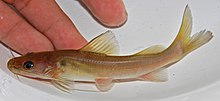Bagridae
| Bagridae | |
|---|---|

| |
| Hemibagrus planiceps | |
| Scientific classification | |
| Domain: | Eukaryota |
| Kingdom: | Animalia |
| Phylum: | Chordata |
| Class: | Actinopterygii |
| Order: | Siluriformes |
| Superfamily: | Bagroidea |
| Family: | Bagridae Bleeker, 1858 |
| Genera | |
Bagrichthys
| |
The Bagridae are a family of catfish that are native to Africa (Bagrus) and Asia (all other genera) from Japan to Borneo.[3] It includes about 245 species. These fish are commonly known as naked catfishes or bagrid catfishes.
Many large bagrids are important as a source of food. Some species are also kept as aquarium fishes.[3]
Physical characteristics
The dorsal fin is preceded by a spine. The adipose fin is present and can have a relatively long base in some species. The pectoral fin spine can be serrated. The body is completely naked (they have no scales). The maximum length is about 1.5 m (4.9 ft).[3] Fishes of the family Bagridae have four pairs of well-developed barbels covered by a layer of taste bud-enriched epithelium.[4]
Taxonomy
The taxonomy of this family has changed rapidly. Nelson (2006) comments how "the family is very different from that recognized in Nelson (1994)".
It is unclear whether or not the family is monophyletic, and what its relationship to other catfishes might be.[3]
References
- .
- S2CID 83515164.
- ^ ISBN 0-471-25031-7.
- S2CID 7407010.
- PMID 26751688.
- ^ "Catalogue of Fishes". California Academy of Sciences. Retrieved 9 August 2017.
